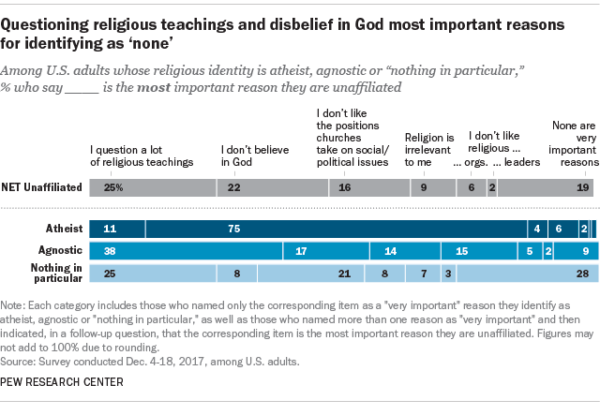Preparing Gen Z to be Lights in a Dark World
Written by Patience Griswold
Pew Research recently released a report on an accelerating trend in the U.S. — adults who were raised in Christian homes and who formerly described themselves as Christian leaving the Christian faith and joining the growing number of religious “nones.” According to Pew, nearly a third of those raised Christian describe themselves as “nothing in particular” as adults. This trend is expected to continue in the next few decades. Combined with a decrease in “transference” — that is, children who were raised in Christian homes becoming Christians themselves — Pew’s research team predicts that between 2050 and 2070, the majority of Americans will not describe themselves as Christians.
This trend is sobering because it shows that a growing number of people are living their lives without the hope of the gospel. While some of the decline in Christianity in the U.S. is likely due to a shift in cultural attitudes toward Christianity leading to fewer people describing themselves as Christians without holding strong convictions, the rise of “deconstruction” has seen a not insignificant number of young people who once expressed zeal for their faith now rejecting Christianity.
Pew’s prediction is that this shift won’t see its full effect until 30 to 50 years from now. However, their research and research from other groups show that America’s teens and young adults are already experiencing this shift. Atheism is more widespread among Generation Z than any previous generation in the U.S. Just over half of America’s teenagers are Christians, and a little less than half of adults in their 20s.
In an increasingly secular culture, young people are facing enormous pressures, and these pressures are often personal as holding to biblical teaching on things like sexuality, or even the idea that there is only one way to salvation, can quickly get a person labeled as a hateful bigot and socially ostracized. In addition, many Evangelicals of all age demographics are struggling to grasp basic teachings of the Christian faith. Ligonier Ministries and Lifeway Research release a “State of Theology” survey every two years and the most recent findings revealed that nearly half of Bible-believing Evangelicals say that God “learns and adapts to different circumstances” and 65 percent believe that people are born without original sin.
For many, deconstruction is not simply an issue of intellectual doubt. In fact, that may not be the driving force at all. Rather, it is a combination of an onslaught of social pressures and the lack of a thorough understanding of the basics of the Christian faith. Regardless of someone’s reason for deconstructing, whether it was a lack of sincerity in the first place, intellectual doubts, a weak grasp of biblical teaching, or an inability to face the pressure of an increasingly secular society, our hearts toward them should be one that deeply desires to see them reconciled to God because, through Christ, we have been reconciled.
The rapid decline of Christianity in the U.S. means that for a growing number of people, especially young people, the idea that life has meaning and purpose is not assumed. This has implications that go beyond the individual. Throughout history, the idea that humans have innate value and dignity has been the exception, rather than the norm. Apart from the realization that humans are inherently valuable because they are created in the image of God, societies do not typically establish laws that reflect and uphold human dignity, especially for the most vulnerable.
So how do we respond to the rise in secularization, especially among the next generation? How do we equip today’s young people to be lights in a dark world?
First, as noted earlier, too many Christians are missing a basic grasp of key doctrines. Sincerity is not a replacement for substance. Young people will have their faith challenged and they need to understand what they believe and why.
Secondly, the next generation needs the local church. The Christian life is not meant to be lived in isolation — we are part of a body, and body parts do not thrive, or for that matter survive, if they are unattached to the rest of the body. Older adults need to model what a lifestyle of discipleship looks like, and young people need to invest in community with other believers in order to learn from and imitate more mature believers.
Thirdly, it is vital for each of us to remember that love and compassion cannot exist without the truth. Many of the most significant pressures facing today’s young people are coming from movements that describe themselves as loving, compassionate, and accepting but are at odds with the truth. True compassion and love never affirm lies, and it is unloving to refuse to speak the truth out of fear of what others will think.
Finally, we must remember that we are called to faithfulness, no matter the circumstances. The gospel transforms lives, and transformed people transform communities and culture. We are called to live in a way that glorifies God, to proclaim the truth, and to trust him with the results.
The decline of Christianity in the U.S. should grieve us because it has real consequences for coming generations and reveals the number of people who are living their lives without the hope of the gospel. As the rising generation faces the challenge of living in an increasingly secular culture, we must equip them to know, love, and live out the truth of God’s word.
This article was originally published at MFC.org.


